As a new mom, I know firsthand that feeding your baby right is a big deal. The right nutrients will help set your child up for success, while neglecting to expose your little one to a variety of flavors early on may lead to lifelong picky eating.
Table of Contents
Not all parents have the time or inclination to make baby food from scratch, so many turn to trusted brands and purchase pre-made foods to serve instead. Even as a new mom raising my little one on an organic farm in Michigan, I don’t always have the time to cook, which means pre-made baby food can be a lifesaver!
Unfortunately, a groundbreaking report shows you might be getting more than you bargained for with many brands—unsafe levels of toxic heavy metals.
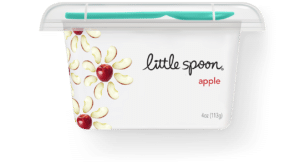
Most comprehensive organic baby food menu
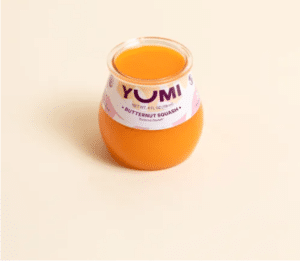
Our favorite organic baby food runner up
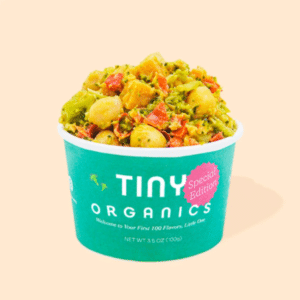
Best flash-frozen organic baby food
Heavy Metals in Premade Baby Food? Understanding the Headlines
In early 2021, a report emerged from a US congressional subcommittee that several leading brands of baby food contained alarming amounts of toxic heavy metals like arsenic, lead, cadmium, and mercury. Many favorites made the list, including Gerber, Earth’s Best Organics, Plum Organics, Beech-Nut, and Sprout Organic Foods.
This report noted that baby food manufacturers were only required to test individual ingredients for their heavy metal content, not the final products. This meant they were significantly underreporting the actual levels.
In fact, certain baby food products contained up to 91 times the arsenic, 177 times the lead, five times the mercury, and 69 times the cadmium legally permitted in bottled water.
This is a big deal. Leading research unequivocally states that heavy metals are dangerous to human health, and even low levels can lead to severe problems for a baby’s brain development. For example, exposure at an early age is linked to lower IQ scores, less future economic productivity, and even an increased risk of criminal and antisocial behavior in adulthood.
The best organic baby foods: our top picks
So, what’s a concerned parent to do? Serving your child premade baby food is still a smart idea, so long as you can trust the supplier.
For extra safety, consider only brands that sell food that is certified organic. The USDA National Organic Program provides strict standards for certified products, meaning you can be sure they are free of artificial colors, preservatives, and flavors. From a health standpoint, studies show that organic produce often contains more antioxidants than its conventionally grown counterparts. That’s good news for your baby’s immune system.
Below are five of the best organic baby food brands you can buy online. Some are also available in stores, while others only operate on a subscription basis. These companies cater to a range of ages and eating styles, meaning you can find the one that’s the best fit for your baby. We believe you can’t go wrong with any of these brands.

Little Spoon
Highlights: Little Spoon offers a wide selection of purees and plated meals with ingredients that will challenge your baby’s taste buds. You can start your baby at six months and stick with a Little Spoon subscription through the toddler years.
Price: $2.74-$3.49 per 4-oz meal
Food Styles: Single and multi-ingredient purees in spoon-friendly containers, plated meals, powdered nutrient boosters.
Little Spoon aims to make those early mealtimes easier with a subscription program for premade baby food. You’ll answer a few questions about your baby’s age, eating level, and known allergies before you’re shown three purchase choices for a week’s worth of meals, varying from one, two, or three meals per day. If you commit, you’ll receive fresh baby food every two weeks, all made from organic ingredients and free from preservatives.
The company incorporates a rotating menu of recipes made from over 100 organic ingredients. These vary from purees (Babyblends), toddler-friendly meals (Plates), and concentrated natural remedies, vitamins, and probiotics in powdered form (Boosters).
All Little Spoon meals are made in the company’s Southern California kitchen and are pasteurized with Cold Pressure Technology that ensures their safety during shipping. They arrive chilled with ice packs, and you can keep them in the fridge for up to 14 days after delivery before serving them. Babies can eat the meals straight from the refrigerator, or you can warm them by spooning the food into a microwave-safe bowl or warming the container in hot water for a few minutes. All Little Spoon’s sustainable packaging is also rated for curbside recycling.
Little Spoon wins points for its comprehensive menu that includes unique flavors designed to challenge developing tastebuds. Some of the more unusual flavors currently available include “Peppermint Swirl” (apple, vanilla, mint, pineapple, raspberry, and corn) and a blend of carrot, apple, buckwheat, cinnamon, pumpkin seeds, and flax oil. You can also purchase single-ingredient purees for the youngest eaters.
If you want convenience, Little Spoon lets you set up orders once and receive baby food twice a month automatically. It’s also easy to transition to plated meals once your baby outgrows purees. Just keep in mind that this chilled food requires significant fridge space when it arrives and that everything must be eaten with two weeks (the company doesn’t recommend freezing its purees).

Yumi
Highlights: Yumi’s range of foods designed for distinct developmental stages will make mealtimes easy for new parents. Weekly delivery makes storage simple, and we also appreciate that Yumi regularly introduces new flavors into the roster.
Pricing: $3.20-$4.30 per 4-oz meal.
Food Styles: Premade meals and finger foods for five eating stages
Yumi sells a subscription program for fresh, organic baby food that ranges from purees to finger foods. The brand offers premade baby foods for five unique eating stages:
- Stage 1 (5 Months): Smooth single-ingredient purees
- Stage 2 (7+ months): Smooth multi-ingredient purees
- Stage 3 (9+ months): Multi-ingredient purees with seeds or grains
- Stage 4 (10+ months): Chunky mix of multiple ingredients.
- Stage 5 (11+ months): nutrient-dense finger foods
You can choose between more than a dozen-plus flavor options for each stage, with up to four new flavors introduced each week.
In this way, your Yumi subscription can grow with your kid—sign up when your baby reaches five months old, and you may not need to supplement with other foods until after she reaches her first birthday. Everything arrives pre-chilled every week, which means you won’t have to worry about storing too much food in your fridge at once.
Regarding food quality, all Yumi ingredients are certified organic and made fresh at the company’s LA headquarters. A lack of preservatives means that the meals only last in the fridge for a week, but you can freeze them after delivery for up to two months.
Every meal is free of added sugars and sweetened only by the produce it contains. This averages to a 3:1 ratio of sugar to fiber per Yumi jar (the company claims the average squeeze pouch is 12:1). The meals are also free of the “Big-8” baby allergens and are gluten-free and dairy-free.
Likewise, Yumi avoids using rice in its meals due to the potential for high arsenic content. It also claims to use just a fraction of the apples as other companies, which tend to rely on them as cheap filler ingredients. The company also sources the majority of its produce from California farms, where soils have a lower heavy metal content than other areas.

Tiny Organics
Highlights: This subscription baby food company sells flash-frozen finger foods for easy mealtimes. Just keep in mind you need to wait until your child is slightly older before trying them out.
Price: $4.69-$5.49 per 3-oz meal
Food Styles: Organic, plant-based finger foods
If you’re looking for a baby food company that won’t deal only in purees, then Tiny Organics is worth a second look. This subscription baby food company is appropriate for babies eight months and older that are ready to become adventurous eaters (even if they don’t have teeth yet!).
Tiny Organic’s premise is that developing your child into an adventurous eater happens best when they are exposed to 100 different flavors before age two. The brand’s dishes highlight an assortment of ingredients, ranging from parsnips to cannellini beans, fennel, and goji berries. Over 70% of the provided meals are savory-focused, meaning your child’s taste buds won’t become too desensitized to sweeteners. The meals are also free of the Big-8 allergens.
All Tiny Organics meals consist of soft finger foods that are pinchable for small fingers. This promotes self-feeding while helping babies master their fine motor skills. Each 100% organic, plant-based meal arrives in a three-ounce container and looks similar enough to adult food you might be tempted to sneak a bite.
Tiny Organics meals are only available on a subscription basis, meaning you need to commit to delivery every two to four weeks. They arrive flash-frozen and packed in dry ice, and must be stored in the freezer and heated before serving. You can heat the microwave-safe containers directly for easy serving.
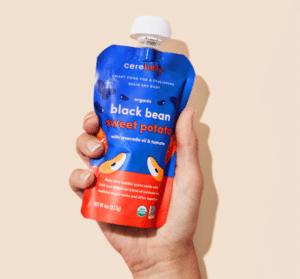
Cerebelly
Highlights: Cerebelly sells baby food purees and snack bars formulated for your baby’s every growth stage. But despite these claims, it may not offer much that’s unique from other brands.
Price: $2.17-$2.89 per 4-oz puree, $3.74-$4.99 per 5/pack Smart Bars
Food Style: Purees in pouches, granola bars
This baby food brand takes a neurological approach to its recipes by focusing on ingredients that support the different stages of your baby’s brain development. You can purchase purees or ‘Smart Bars’ that contain blends of organic, plant-based ingredients. Each formula contains vegetables as the first ingredient to limit the naturally occurring sugars and prevent babies from becoming too attached to sweetness right away.
The brand suggests taking its quiz to determine which ingredients are most optimal for your baby’s age. It includes questions about your baby’s cognitive, language, social, and visual abilities. For example, it recommended that I feed my four-month-old the following mix of purees: carrot-pumpkin, sweet potato-mango, spinach-apple-sweet potato, and broccoli-pear.
Parents can switch out any recommend flavor for others within the brand’s collection, though, so Cerebelly may be overstating the importance of its blends’ timing from a nutritional standpoint.
These purees are shipped in shelf-stable 4-oz pouches, so no refrigeration is required. If you want to heat them before serving, you’ll need to squeeze them into a microwave-safe container first. The pouches and caps themselves are guaranteed BPA-free, BPS-free, phthalate-free, and melamine-free. You can recycle them, but only through the brand’s TerraCycle partnership—meaning you must clean them out and ship them back.
Cerebelly’s Smart Bars are aimed towards older kids and contain protein without added sugar as well as ‘ten brain-supporting nutrients.’ This nutrient blend consists of spinach, squash seeds, kelp, mushrooms, sunflower seeds, and other plant-based ingredients.
As with many organic baby food brands, Cerebelly highlights its connection to the suppliers, stating that it works with dozens of farms that are rigorously vetted for quality and ingredient purity, and the brand only purchases the highest grades of produce available. Sometimes, the brand will hold taste tests between ingredients from two suppliers to determine which is sweetest and most flavorful for its purees.
Most (but not all) of the farms Cerebelly works with are in the states surrounding its California production facility.
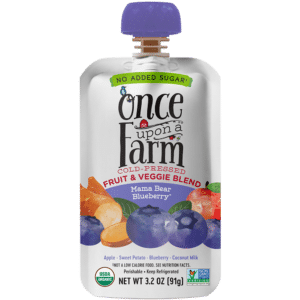
Once Upon a Farm
Highlights: This celebrity-inspired baby food brand offers tasty purees made from quality ingredients. We scored it lower because there isn’t much variety with the product selection and the lack of finger foods means the brand doesn’t offer a comprehensive eating program for little ones.
Pricing: $39-$42 per 12-pack of pouches or $3.29/pouch (plus $12 shipping unless the order is over $45)
Food Styles: Baby and toddler-friendly fruit purees and smoothies in squeezable pouches
Actress and mother Jennifer Garner is the co-founder of this organic baby food company, which produces cold-pressed baby food purees and toddler-friendly snacks. Most pouches contain multiple ingredients, and they are sorted by age appropriateness from six months on. The website highlights clear ingredient information as well as which flavors contain potential allergens.
The company stands out from other online baby food providers because you don’t have to sign up for a subscription to try it—though you’ll save lots on shipping if you do.
All Once Upon a Farm products are made from 100% certified organic, non-GMO ingredients that are preserved using Cold-Pressure (HPP), not artificial preservatives. This makes them shelf-stable for years, so you don’t need to worry about making fridge space or feeding them to your baby fast.
Many of the recipes contain only fresh produce, though others include nutrient-dense fats like quinoa, coconut, avocado, and flax seeds.
Beyond using sustainably sourced ingredients, Once Upon a Farm’s packaging is recyclable through its partnership with TerraCycle. Just note you will need to save the pouches separately and send them directly to the program with a pre-paid shipping label.
More reading for new parents
In addition to the research above on organic baby food that is free from heavy metals like arsenic, you may find some of these posts of interest as well: